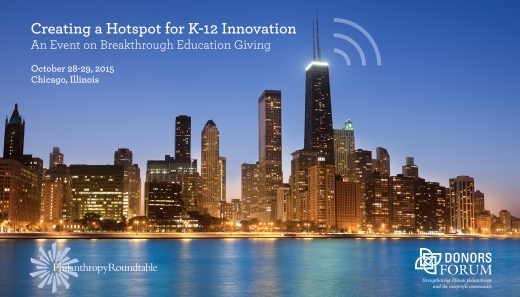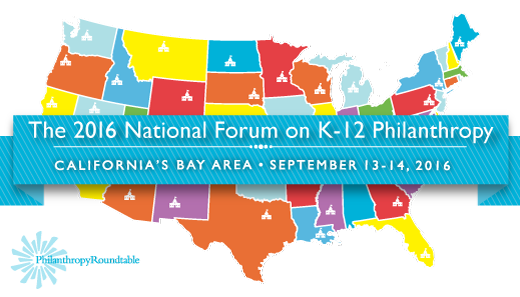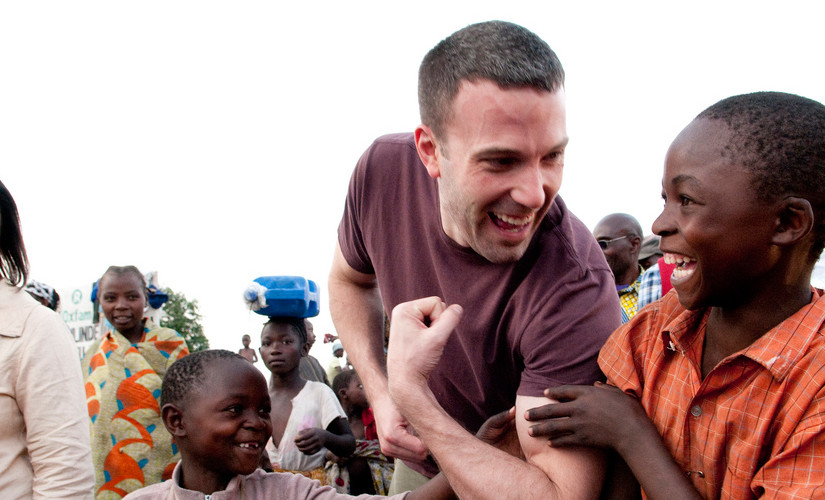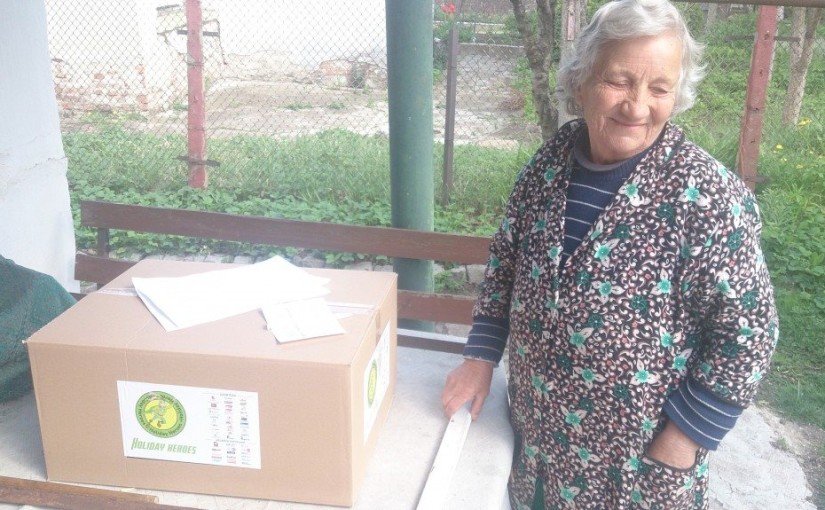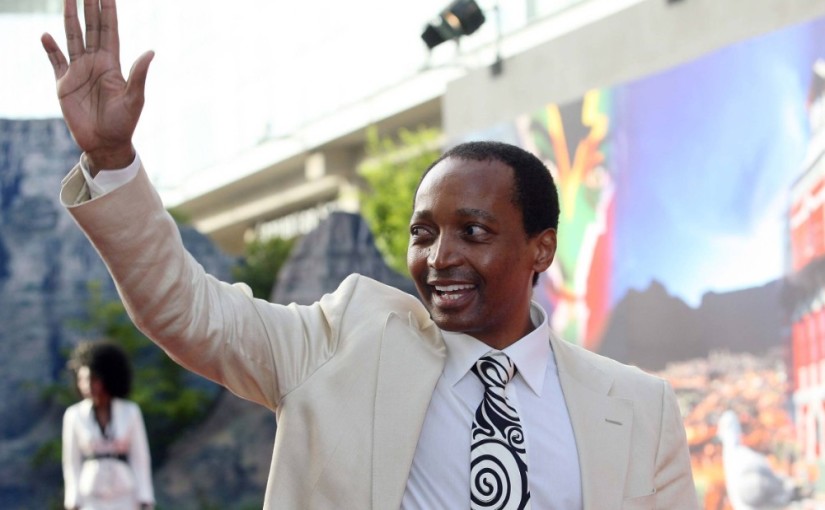Creating a Hotspot for K-12 Innovation
A Philanthropy Roundtable Event on Breakthrough Education Giving
Co-hosted by Donors Forum
Sofitel Chicago Water Tower • Chicago, Illinois
October 28-29, 2015
Chicago is becoming a center for big K-12 ideas and an ideal setting to discuss how donors and education entrepreneurs can create dramatic improvements for kids nationwide. Home to a new crop of personalized learning models, design incubators, and promising startups, the city also boasts emerging innovators in charter schools, policy, leadership development, and advocacy. Chicago’s forward-thinking donors, investors, and venture philanthropy funds also make the city an exciting place to discuss how funders can make a big difference by thinking outside the typical K-12 box.
Attendees had the opportunity to spend two days with hundreds of leading education philanthropists, visit inventive schools, and join high-level strategic conversations about effective K-12 giving.
Event Schedule
Wednesday, October 28, 2015
7:30 a.m. – 1:00 p.m. Site Visits
Chicago’s Next Generation Learning Models
Attendees had the opportunity to visit leading examples of personalized learning, including Intrinsic Schools, a learning environment unlike any other school. Intrinsic is made up of interconnected “pods,” each an open studio with spaces dedicated to individual and small-group learning. Students receive personalized learning plans to monitor their academic progress, and access a school-wide blended learning tool as well as Socratic style teaching. Perhaps most astounding is that the cost of this futuristic and breathtaking space was one-fourth the cost of comparable district schools. We also visited two other exemplary models: Chavez Multicultural Academy, a district school, and Chicago International Charter School: West Belden.
7:00 a.m. Registration Opens
Sofitel Chicago Water Tower
20 East Chestnut Street
Chicago, IL 60611
7:30 a.m. Bus Departures Begin
Donors had two options for their first site visit school:
• Cesar Chavez Multicultural Academic Center
• Chicago International Charter School: West Belden
After this first site visit, both groups convened at Intrinsic
Schools and toured as one combined group.
1:00 p.m. Return to Sofitel Hotel
• Networking Luncheon
2:00 p.m. – 3:00 p.m. Optional Discussions
Session #1: What’s Working to Educate High-Ability, Low-Income Students
Giuseppe Basili, director of strategic initiatives, Jack Kent Cooke Foundation
Paula Olszewski-Kubilius, professor, School of Education and Social Policy, Northwestern University
Chester E. Finn Jr., president emeritus, Thomas B. Fordham Foundation (moderator)
Session #2: How Donors Can Make Meaningful Early Childhood Investments
Katherine Kaufmann, partner, The Bridgespan Group
Diana Rauner, president, Ounce of Prevention Fund
3:10 p.m. – 4:10 p.m. Opening Plenary
Welcome
Adam Meyerson, president, The Philanthropy Roundtable
Cultivating The Next Generation of Education Startups
Deborah Quazzo, founder and managing partner, GSV Advisors
Margaret Angell, director, education innovation portfolio, CityBridge Foundation
Alicia Herald, founder and CEO, myEDmatch
Deborah McGriff, partner, NewSchools Venture Fund (moderator)
We made a special visit to LEAP Innovations, Chicago’s nationally-recognized education innovation center that helps educators and entrepreneurs reimagine learning and develop next-generation school models. Located in 1871, Chicago’s hub for all digital startups, attendees got a rare glimpse into how talented entrepreneurs use dedicated space and resources to test ideas, validate concepts, engage technical experts, work with mentors–and ultimately turn big ideas into reality.
5:00 p.m. Opening Reception and Open House: LEAP and 1871
6:00 p.m. Big-Idea Pitches
Solving America’s Toughest K-12 Problems
Attendees had the opportunity to hear a number of solicitation-free, big-idea pitches from newly-forming education organizations, schools, and initiatives from around the country. Following brief reactions from a panel of experts, attendees were able to ask questions and offer constructive feedback.
Welcome
Jim Oliff, chairman, CME Group Foundation
Master of Ceremonies
Phyllis Lockett, CEO, LEAP Innovations
Pitches
Brian Hill, co-founder and CEO, Edovo
Gareth Genner, founder and CEO, Parish Academy
Blair Pircon, CEO, The Graide Network
Amy Charpentier, KIPP Through College director, KIPP: Delta
Ryan Hoch, co-founder, Overgrad
Expert Respondents
Barton Dassinger, principal, Chavez Multicultural Academic Center
Edith Gummer, education research director in research and policy, Ewing Marion Kauffman Foundation
Deborah Quazzo, founder and managing partner, GSV Advisors
7:00 p.m. LEAP Reception
Thursday, October 29, 2015
7:15 a.m. Breakfast Roundtable Discussions
1. How Cities Can Develop Plans for Increasing the Number of High-Quality School Seats
Butch Trusty, chief impact officer, Education Cities
2. How New Approaches to Teacher Certification Can Transform Public Education
Don Nielsen, senior fellow, Discovery Institute
3. Building a Network of Independent Schools: Lessons from 20 Years of Growth
Jane Genster, president and CEO, Cristo Rey Network
4. How Can Donors be Effective in Supporting Alternatives to “College-For-All”
Blouke Carus, chairman emeritus and chief technical advisor, Carus Corporation
5. Hope Outside the Box: How Schools can Create Unconventional Funding Streams by Serving their Communities
Bob Muzikowski, president and founder, Chicago Hope Academy
6. Bridging the Opportunity Divide Through Career Preparation
Jack Crowe, executive director, YearUp Chicago
7. How to Develop High Schoolers into Real-World Entrepreneurs
Michael Miles, co-founder, INCubatoredu
8. How Charter Schools Can Promote Character and Civic Virtue
Steve Barney, trustee, Barney Family Foundation


